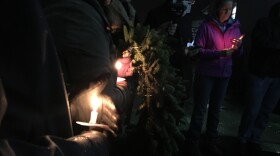In Eugene, there are some innovative programs and initiatives to provide emergency shelter. That includes the Rest Stop program which offers small temporary dwellings for people who are homeless. As KLCC’s Denise Silfee discovered, while that shelter can save lives it doesn’t guarantee access to another basic human need: running water for drinking, hygiene and sanitation.
NATHAN SHOWERS: Before it gets too dark, we have a kitchen over here.
Nathan Showers manages the Rest Stop in the Amazon neighborhood in South Eugene.
NATHAN SHOWERS: Now, we don't really have running water here at all. We have this for washing hands, dishes and stuff like that. It's on wheels, so we'll wheel over the Good Samaritan and fill it up.
We’re in a tented area with a lockable metal cabinet of non-perishable food, a gas grill and plastic jugs for water.
NATHAN SHOWERS: We've got these down here that are drinkable water. And that's all for coffee and noodles and stuff like that. So that's our water situation around here.
Shelter is not the same as housing: access to running water is not a requirement for approving a Rest Stop in Eugene. Two portable toilets sit in the corner of the parking lot, but water for handwashing, showers, cooking and drinking is up to residents to locate on their own.

Tracy Joscelyn also lives here and described the challenges of trying to meet basic hygiene needs.
TRACY JOSCELYN: The worst part is being cold, so you can go to the service station and get a shower, but it takes all day. But if you don't get a shower in the morning, like I will not take shower after three, because then I'm freezing all night.
Weather is a big consideration for people who know they won’t have a heat source at night. Frostbite is one of the most prevalent medical conditions that people living on the streets, in temporary shelters or cars are treated for during colder months.
TRACY JOSCELYN: But you know, so you sponge bath. A lot of women I've known have been really diligent and I'm just like, wow, you're so good at this. I have a friend's house; if I didn't, I have gone to the service station quite a few times.
Tracy says that some people use the pay-to-use showers at Amazon and the YMCA, but of course pay-to-use means you have to have the money to pay. Free showers are available at the St. Vincent de Paul service station on highway 99 and the Eugene Mission, but can be difficult to access due to a lack of transportation or time. One other place people can count on a shower:
TRACY JOSCELYN: Jail. Some people, is a lot of the time, some people that is the only time they get cleaned up.
In 2010, the United Nations General Assembly passed a resolution stating that access to water for drinking, hygiene and sanitation is a basic human right. The U.S. was one of 41 nations that abstained from ratifying the resolution, while other countries like Mexico and Honduras developed constitutional articles making the right to water a legal right.
The U.N. says there are 3.5 million people globally that lack access to water for hygiene and sanitation. This leads to millions of personal and public health crises, from infections to outbreaks of disease. It also keeps people from participating in society: proper hygiene is a major requirement for social inclusion.
KATIE MEEHAN: Infrastructure is, as many scholars will argue, a symbol of citizenship. And I don't mean this in who has a passport or sort of birthright citizenship, I mean infrastructure is a symbol of citizenship as to who belongs and who doesn't belong to the nation.
Former University of Oregon professor Dr. Katie Meehan now teaches at King’s College in Cambridge. She is an expert in international water policy. She says that changing the way we think about who receives services will take a paradigm shift.
KATIE MEEHAN: The United States currently does not take a humans rights approach to water policy or water management. And that is one of the problems and that is where we see people who fall through the cracks, such as the unhoused.
Benjamin Brubaker, administrative coordinator at White Bird Clinic in Eugene, says the lack of access to water costs the community money. Preventable diseases require more visits to the hospital, and complaints about unsanitary conditions and poor hygiene lead to increased interactions with police. Brubaker says there are currently more needs than there are services.
BENJAMIN BRUBAKER: For a long time we’ve been advocating for localized options for people to be able get those kinds of basic needs met. We think we need low-barrier day access and low-barrier shelter downtown where people are currently at. We think we need to see more access to public restrooms.
Brubaker suggests that local businesses could be more welcoming to those seeking bathrooms and running water.
What’s been made clear over the past several months is the need for shelter is not going away. As homeless advocates work with the city and local businesses to negotiate shelter near or in the downtown core, how to meet other basic needs must also be addressed. Shelter provides protection from the elements, but access to running water allows people to participate in the broader community by allowing them to stay healthy and to maintain their basic human dignity.
This story was produced in collaboration with the UNESCO Crossings Institute at the University of Oregon.
Copyright 2019 KLCC.






